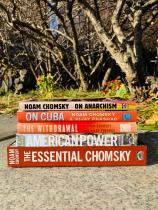A Noam Chomsky Reading List
By:
PublicityMonday, December 2, 2024

By Sade Collier, Fall 2024 intern
Anyone seeking to concern themselves with domestic and foreign policy should consider the prolific archive from Noam Chomsky’s tenure as a linguist and social theorist. Driven by moral precision and a rejection of the axiomatic features of American imperialism, Chomsky has spent a lifetime exposing the hypocrisies of Western intelligentsia and mass media. Chomsky’s prescience shines through all of his writing—though I have reason to believe that he would disagree with this sentiment. In one of his most-cited essays “The Responsibility of Intellectuals,” which was later published as a book, Chomsky makes clear the role of the public intellectual: “If it is the responsibility of the intellectual to insist upon the truth,” he writes, “it is also his duty to see events in their historical perspective.” Like The New Press founder André Schiffrin, Chomsky actively interrogates how American policymakers and the intellectuals that uplift them enforce U.S. economic and political control on a national and international scale.
We here at The New Press invite our community to join us in a celebration of the the ongoing brilliance of Noam Chomsky as he prepares to turn ninety-six on Saturday, December 7. Chomsky’s commitment to clarity has shaped how leftist thinkers and activists challenge the U.S. empire in countries such as Cuba, Laos, Palestine, and Vietnam. Without his firm assertion that every person is capable of developing moral expertise, we might be less emboldened to remark on the damaging intentions of mainstream media – and those in power.
Reflecting on Chomsky, I am reminded of a quotation by Toni Morrison, from an acceptance speech she delivered upon receiving the 1993 Nobel Peace Prize in Literature (coincidentally, this speech was performed on Chomsky’s birthday). “We die. That may be the meaning of life,” Morrison famously says. “But we do language. That may be the measure of our lives.” As an esteemed linguist, Chomsky studies the scientific function language has in our lives. As a social theorist, his particular command of language has shaped the lives of those he reaches as a public figure.
To celebrate, we’re sharing several excerpts from books Chomsky has published with The New Press that inform how we lead our lives. We hope our readers will continue to read Chomsky thoughtfully and measure his words concurrent to the arc of an international frame of justice.
* * * * * * * * * *
This past summer, The New Press published a reflective, intimate conversation between Noam Chomsky and Vijay Prashad on the unique international influence of revolutionary Cuba. Chomsky revisits his critique of a media that has continued to sharpen the division between the two countries.
The Essential Chomsky, edited by Anthony Arnove
For those who can’t get enough of Noam Chomsky’s writings on politics and language, editor Anthony Arnove compiled this seminal one-volume collection of his work.
In his first political book, Chomsky denounced the American war in Vietnam and became established as a leading critic of United States foreign policy. Howard Zinn provides the foreword of this powerful collection of essays addressing the horrors inflicted by the American empire and its mainstream media mouthpieces, who bolstered support for the war.
With a foreword by Angela Y. Davis, Noam Chomsky and Vijay Prashad discuss the parallels between failed military interventions and wars in Iraq, Libya, and Afghanistan and the American war in Vietnam.
This is a book for anarchists at every level. On Anarchism sheds a much-needed light on the foundations of Chomsky’s thought, specifically his constant questioning of the legitimacy of entrenched power.
Blog section:
